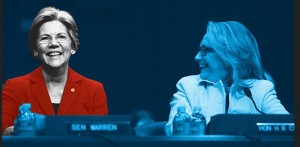Simon Johnson writes: America’s presidential election is still nearly two years away, and few candidates have formally thrown their hats into the ring. But both Democrats and Republicans are hard at work figuring out what will appeal to voters in their parties’ respective primary elections – and thinking about what will play well to the electorate as a whole in November 2016.
The contrast between the parties at this stage is striking. Potential Republican presidential candidates are arguing among themselves about almost everything, from economics to social issues; it is hard to say which ideas and arguments will end up on top. The Democrats, by contrast, are in agreement on most issues, with one major exception: financial reform and the power of very large banks.
The Democrats’ internal disagreement on this issue is apparent. On Dodd-Frank, Democrats differ on the extent to which they should stick up for their own reforms. In December, the White House agreed to a Republican proposal to repeal a provision of Dodd-Frank that would have limited the risk-taking of the country’s largest banks (in fact, the proposal’s language was drafted by Citigroup).
More recently, however, Obama has threatened to veto any further attempts to roll back financial reform. He a proposing a small tax on the largest banks’ liabilities, which he hopes will encourage “them to make decisions more consistent with the economy-wide effects of their actions, which would in turn help reduce the probability of major defaults that can have widespread economic costs.”
In contrast, the Center for American Progress report devoted very little space to financial-sector reform.
But a serious challenge to all of these views has now emerged, in proposals by Senator Elizabeth Warren, a rising Democratic star who has become increasingly prominent at the national level. In her view, the authorities need to confront head-on the outsize influence and dangerous structure of America’s largest banks.
Warren’s opponents like to suggest that her ideas are somehow outside the mainstream; in fact, she draws support across the political spectrum.
Warren’s message is simple: remove the implicit government subsidies that support the too-big-to-fail banks. That single move would go a long way toward reducing, if not eliminating, crony capitalism and strengthening market competition in the financial sector.
The big Wall Street banks have enormous influence in Washington, DC, in large part because of their campaign contributions. They also support – directly and indirectly – a vast influence industry, comprising people who pose as independent or moderate commentators, edit the financial press, or produce bespoke “research” at think tanks.
The Democrats need to figure out their policy on Wall Street. In the past, they have simply gone for the campaign contributions, doling out access and influence in exchange. It is now obvious that this is not consistent with defending what remains of Dodd-Frank.
Warren offers a plausible, moderate alternative approach to financial-sector policy that would attract a great deal of support in the general election. Will the Democrats seize the opportunity? Hillary Clinton is on Wall Street’s payroll.

